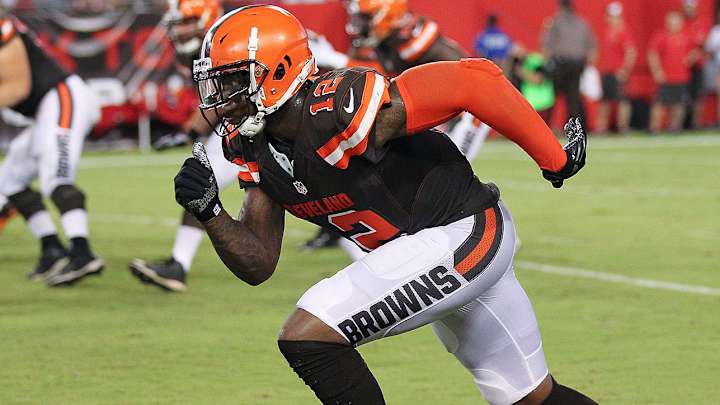Arrest warrant over paternity test puts Josh Gordon in legal trouble again

Talented but troubled Browns wide receiver Josh Gordon—who was suspended 11 games during the 2014 season, 16 games in ’15 and the first four games of ’16—is in hot water once again.
Gordon is the target of an arrest warrant issued by Cuyahoga County Juvenile Court Judge Alison Floyd. According to court records obtained by Cleveland.com, Gordon has failed to respond to multiple subpoenas issued to him and sent to different addresses associated with him in California and Ohio over a period of several months. The subpoenas relate to a paternity suit brought by Ohio resident Christina Lockhart, who claims that Gordon is the father of Lockhart’s one-year-old daughter and has repeatedly sought child support from Gordon. It appears that Gordon has been unresponsive since this matter began in 2015 and has refused to take a court-ordered DNA test.
NFL Week 3 Power Rankings: Impressive Texans on the rise as Colts keep tumbling
To be clear, the arrest warrant for Gordon does not concern whether or not he is the father of Lockhart’s daughter. It concerns Gordon’s alleged failures to respond to multiple subpoenas in a case about whether he is the father. Along those lines, a subpoena is not an invitation to respond to a judge or a mere recommendation that one participate in a legal proceeding. A subpoena is a binding court order to which its recipient must respond. An appropriate response to a subpoena would be appearing as a witness, providing evidence or filing an objection to the information sought by the subpoena. An inappropriate response to a subpoena would be ignoring the subpoena, as Gordon is alleged to have done. Failure to respond to a subpoena can constitute contempt of court, which can lead to an arrest warrant. Normally the accompanying penalty is a monetary fine, but judges have the discretion to impose jail time.
The most likely outcome for Gordon is that he quickly responds to the paternity matter, rushes to court, apologizes and is not jailed. Alternatively, Gordon’s attorneys might insist that the mailing addresses associated with their client are all incorrect and that he never received the subpoenas. Whether Judge Floyd would believe that explanation is another matter.
As an evening update to this story, Gordon, as expected, quickly complied with the warrant and appeared in Cuyahoga County Juvenile Court on Wednesday. Gordon’s attorneys indicate that, if necessary, the paternity matter will be taken up in court again in November.
Even a swift resolution to the legal proceeding would not necessarily insulate Gordon from punishment by the Browns, the NFL or companies with which he has signed endorsement deals. Under Article 46 of the collective bargaining agreement, NFL commissioner Roger Goodell has nearly unlimited discretion in determining whether a player’s off-field behavior constitutes “conduct detrimental” to the NFL and whether a fine or suspension is warranted. On Wednesday an NFL spokesman said that the arrest warrant does not affect Gordon’s status in his return from a four-game suspension to open this season.
Bookmark this page to stream Thursday Night Football live this week on SI.com
To date, Gordon’s troubles have mostly constituted violations of the league’s substance abuse policy, although he was arrested for driving while impaired in 2014 and the Browns suspended him that year for a violation of team rules. This time around, Gordon’s problems are not substance-related. Instead, they concern alleged irresponsibility and poor judgment in a legal proceeding. The NFL will wait to issue any punishment until Gordon has a chance to explain himself in court. In an optimistic sign for Gordon, NFL spokesperson Brian McCarthy on Wednesday told media that Gordon remains eligible to play in Week 5, when the Browns take on the New England Patriots. The league however will certainly be watching for any developments in the case. The 25-year-old Gordon—who hasn’t appeared in a regular season game since Dec. 21, 2014—will need to adhere to rules to avoid an extended stay away from the game.
For many NFL stars who encounter legal problems, the loss of endorsement income is a significant concern in addition to an NFL suspension. Companies that sign players to endorsement deals typically have the contractual capacity to exit an endorsement deal or suspend payments if the player violates a so-called “morals clause.” Such a clause is a standard term in contemporary endorsement deals to discourage the athlete from committing acts that involve “moral turpitude” under the law or that bring the athlete or company into public disrepute or scandal.
It’s unclear whether Gordon is still signed to any endorsement deals—his suspensions have likely diminished any interest sports apparel companies might otherwise have in such a skilled player. It was only a few years ago when Gordon caught 87 passes for 1,646 yards as a 22-year-old. If Gordon can abide by the law and NFL rules, get back on the field and return to dominance, endorsement opportunities might return. We’ll see if he gets there.
Michael McCann, SI's legal analyst, is a Massachusetts attorney and the founding director of the Sports and Entertainment Law Institute at the University of New Hampshire School of Law.
